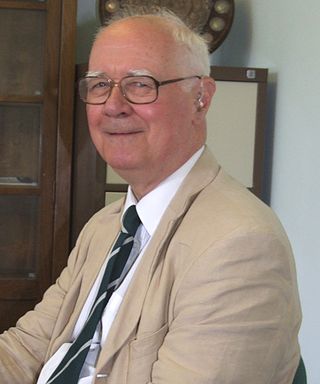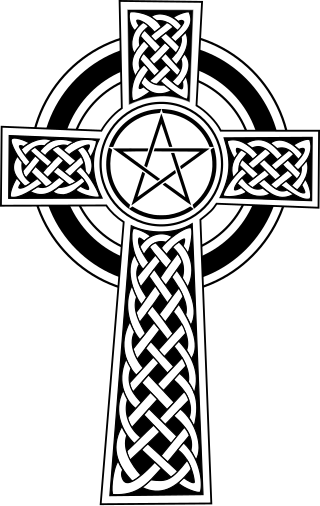Related Research Articles
Theology is the study of religious belief from a religious perspective. More narrowly it is the study of the nature of the divine. It is taught as an academic discipline, typically in universities and seminaries. It occupies itself with the unique content of analyzing the supernatural, but also deals with religious epistemology, asks and seeks to answer the question of revelation. Revelation pertains to the acceptance of God, gods, or deities, as not only transcendent or above the natural world, but also willing and able to interact with the natural world and to reveal themselves to humankind.

John Charlton Polkinghorne was an English theoretical physicist, theologian, and Anglican priest. A prominent and leading voice explaining the relationship between science and religion, he was professor of mathematical physics at the University of Cambridge from 1968 to 1979, when he resigned his chair to study for the priesthood, becoming an ordained Anglican priest in 1982. He served as the president of Queens' College, Cambridge, from 1988 until 1996.

William Lane Craig is an American analytic philosopher, Christian apologist, author, and Wesleyan theologian who upholds the view of Molinism and neo-Apollinarianism. He is a professor of philosophy at Houston Christian University and at the Talbot School of Theology of Biola University. Craig has updated and defended the Kalam cosmological argument for the existence of God. He has also published work where he argues in favor of the historical plausibility of the resurrection of Jesus. His study of divine aseity and Platonism culminated with his book God Over All.
The Gifford Lectures are an annual series of lectures which were established in 1887 by the will of Adam Gifford, Lord Gifford. Their purpose is to "promote and diffuse the study of natural theology in the widest sense of the term – in other words, the knowledge of God." A Gifford lectures appointment is one of the most prestigious honours in Scottish academia. The lectures are given at four Scottish universities: University of St Andrews, University of Glasgow, University of Aberdeen and University of Edinburgh.
Krister Olofson Stendahl was a Swedish theologian, New Testament scholar, and Church of Sweden Bishop of Stockholm. He also served as dean, professor, and professor emeritus at Harvard Divinity School.

Christians in Bangladesh account for 0.30% of the nation's population as of 2022 census. Together with Judaism and Buddhism, they account for 1% of the population. Islam accounts for 91.04% of the country's religion, followed by Hinduism at 7.95% as per 2022 census.
Ed Parish Sanders was an American New Testament scholar and a principal proponent of the "New Perspective on Paul". He was a major scholar in the scholarship on the historical Jesus and contributed to the view that Jesus was part of a renewal movement within Judaism. Sanders identified himself as a "liberal, modern, secularized Protestant" in his book Jesus and Judaism; fellow scholar John P. Meier called him a postliberal Protestant. He was Arts and Sciences Professor of Religion at Duke University, North Carolina from 1990 until his retirement in 2005.

Daniel Baird Wallace is an American professor of New Testament Studies at Dallas Theological Seminary. He is also the founder and executive director of the Center for the Study of New Testament Manuscripts, the purpose of which is digitizing all known Greek manuscripts of the New Testament via digital photographs.
Kevin Jon Vanhoozer is an American theologian and current research professor of Systematic Theology at Trinity Evangelical Divinity School (TEDS) in Deerfield, Illinois. Much of Vanhoozer's work focuses on systematic theology, hermeneutics, and postmodernism.

James McConkey Robinson was an American scholar who retired as Professor Emeritus of Religion at Claremont Graduate University, Claremont, California, specializing in New Testament Studies and Nag Hammadi Studies. He was a member of the Jesus Seminar and arguably the most prominent Q and Nag Hammadi library scholar of the twentieth century. He was also a major contributor to The International Q Project, acting as an editor for most of their publications. Particularly, he laid the groundwork for John S. Kloppenborg's foundational work into the compositional history of Q, by arguing its genre as an ancient wisdom collection. He also was the permanent secretary of UNESCO's International Committee for the Nag Hammadi codices. He is known for his work on the Medinet Madi library, a collection of Coptic Manichaean manuscripts.

Francis Xavier Clooney is an American Jesuit priest and scholar in the teachings of Hinduism. He is currently a professor at Harvard Divinity School in Cambridge, Massachusetts.
S. Scott Bartchy is a New Testament scholar and member of The Context Group, a group of biblical scholars committed to using social-scientific interpretative methods. He is also a member of The Society of Biblical Literature, the Catholic Biblical Association, and the Studiorum Novi Testamenti Societas. Bartchy is Emeritus Professor of Christian Origins and the History of Religion in the Department of History, University of California, Los Angeles, where he taught from 1981 until his retirement in 2013. At UCLA, Bartchy was integral to the founding of the Center for the Study of Religion and served as its director for many years. Under his leadership, the Center began offering UCLA's first undergraduate major in religious studies.
Bernard McGinn is an American Roman Catholic theologian, religious historian, and scholar of spirituality. A specialist in Medieval mysticism, McGinn is widely regarded as the preeminent scholar of mysticism in the Western Christian tradition. He is best known for his comprehensive series on mysticism, The Presence of God.
Vernon Kay Robbins is an American New Testament scholar and historian of early Christianity. He is currently Winship Distinguished Research Professor of New Testament and Comparative Sacred Texts at Emory University, as well as visiting professor of New Testament at the University of Stellenbosch in South Africa. He is a major figure in Markan scholarship and is the creator and a prominent proponent of socio-rhetorical criticism in New Testament studies.

Werner Günter Adolf Jeanrond was Professor of Systematic Theology with special responsibility for Dogmatics at the University of Oslo. He is retired.
Barbara Jane Newman is an American medievalist, literary critic, religious historian, and author. She is Professor of English and Religion, and John Evans Professor of Latin, at Northwestern University. Newman was elected in 2017 to the American Philosophical Society.
George Russell Lakey is an activist, sociologist, and writer who added academic underpinning to the concept of nonviolent revolution. He also refined the practice of experiential training for activists which he calls "Direct Education". A Quaker, he has co-founded and led numerous organizations and campaigns for justice and peace.
Dana Lee Robert is a historian of Christianity and a missiologist. She is a professor at Boston University, where she has worked since 1984. She was the co-founder of the Center for Global Christianity and Mission in 2001, one of the first university-based Centers on World Christianity in North America. For years, Robert held the School of Theology's Truman Collins Professorship in World Christianity and History of Mission, but in 2022 she was installed in the William Fairfield Warren Distinguished Professorship, the highest distinction bestowed upon senior faculty members who remain actively involved in research, scholarship, teaching, and the University’s civic life.
John Edwin Thiel is the Aloysius P. Kelley, S.J. Professor of Catholic Studies at Fairfield University, Fairfield, Connecticut, U.S.A, where he has taught for 47 years.

Christo-Paganism is a syncretic new religious movement defined by the combination of Christian and neopagan philosophies.
References
- 1 2 3 4 "Mark Wallace". www.swarthmore.edu. Retrieved 2020-12-08.
- 1 2 "A 'Christian animist' on God in nature". Broadview Magazine. 2020-05-19. Retrieved 2020-12-08.
- 1 2 "Mark Wallace: Faith After Religion". trippfuller.com. Retrieved 2020-12-08.
- ↑ "Mark Wallace". www.swarthmore.edu. 2014-07-08. Retrieved 2020-12-08.
- ↑ "Chester Semester :: Lang Center for Civic & Social Responsibility :: Swarthmore College". www.swarthmore.edu. Retrieved 2022-03-28.
- ↑ "Chester Semester :: Lang Center for Civic & Social Responsibility :: Swarthmore College". www.swarthmore.edu. Retrieved 2022-03-28.
- ↑ "2019 Grand/Gold Winners – Nautilus Book Awards" . Retrieved 2020-12-08.